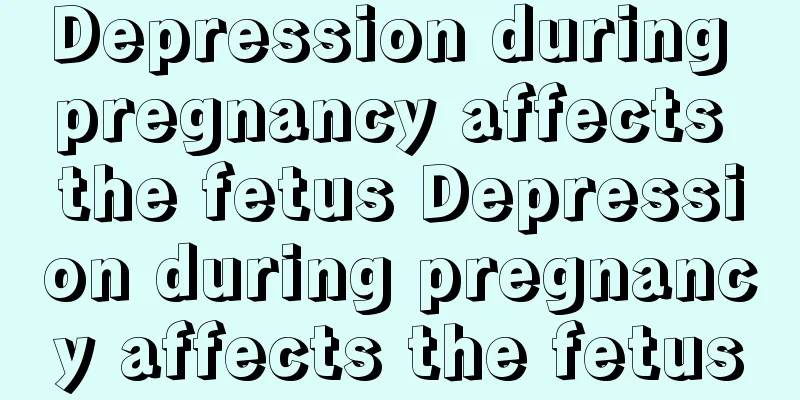How to deal with baby's intestinal gas? Quick solution: physical and drug treatment

|
As adults, I believe you have all experienced the feeling of intestinal gas, which is a feeling of gas in the stomach. If everything goes well, a few farts will make it go away. If not, it will be very uncomfortable to hold it in. For babies whose bodies are not yet fully developed, intestinal gas is even more uncomfortable. Therefore, as parents, you must think of ways to help your baby solve the problem of intestinal gas. Let's take a look at how to quickly solve the problem of baby's intestinal gas. Today I want to talk to you about the annoying flatulence. I have always been very grateful for having an angel baby. The baby's sleep has been very good since the confinement period. He has never had a day-night reversal and can fall asleep on his own within 20 minutes. After eight weeks, the baby can sleep directly from 1 a.m. to 7 a.m., without milk or coaxing to sleep, and does not need night feeding in the middle of the night. The baby will not suddenly wake up in the middle of the night and cry for a hug. The baby can also take a nap during the day, and when awake, the baby always has a sweet smile. If the baby sleeps well, my sleep quality will also be good. On days when I don’t need to feed him at night, I can sleep for at least 6 hours straight! Good sleep leads to good mood, good mood leads to good milk supply, in short, it’s all good~ The baby’s “calmness” and “unconditional cooperation” make me feel that I am extremely lucky, and I sigh, “How can I be so lucky to have such a perfect little prince?” Days passed like this. Until one day, the angel baby gave me a problem. What first caught my attention was that the baby would often suddenly pull at the nipple while feeding, waving his arms and fists vigorously, kicking his legs all the time, and from time to time his face would turn red and he would burst into tears. After a while, he would desperately try to find the nipple and put it in his mouth, and then burst into tears again after a few seconds. It would get better after interrupting the feeding and burping him. Also, the baby woke up crying at 10 o'clock in the evening for a week. At first I thought the baby was hungry, and the crying did not subside after feeding. Then I guessed that the baby might be fussing over sleep, so I held the baby in my arms and walked around. The baby's crying subsided and he soon closed his eyes, but he started crying again not long after I put him back in bed. The baby clenched his fists and twisted them. It felt like he was trying hard. His face was flushed, his abdomen was bulging, and he farted loudly from time to time. He cried and cried on and off until 1 o'clock in the middle of the night before he could fall asleep peacefully. The baby was always restless in the middle of the night, often humming with his eyes closed, making humming sounds, and twisting his body. Near morning, his legs would be stretched out and tense, and his face would be flushed. Is this still my angel baby? As a mother, I feel particularly bad when my baby cries. I consulted many mothers around me, and also started to look up information and ask pediatricians. I found that the above symptoms are very common in newborns. It is the annoying guy "intestinal gas" that snatched the crown of the angel baby! I have sorted out the relevant knowledge about intestinal gas, which will be used by pregnant mothers soon, and new mothers should also remember to save it. The following methods have been tested and effective to deal with intestinal gas~ What is intestinal flatulenceThe immature development of the gastrointestinal tract of infants causes incoordination of intestinal peristalsis, which is easily affected by flatulence, causing intestinal flatulence, which is what we call "intestinal flatulence". Intestinal flatulence usually starts in the second month after the baby is born, and it disappears when the baby is about 3-4 months old after premature babies. There is no difference between boys and girls, and there is no difference between breastfeeding and formula feeding. Common manifestations include - gurgling stomach, frequent gas and farting. "Gurgling" is the baby's stomach and intestines adapting to the environment. The fetus' intestines are sterile in the mother's body. After birth, the baby starts to breastfeed, so the intestines begin to come into contact with external bacteria. When there are more bacteria in the intestines that can break down food and produce gas, there will be more gas in the baby's intestines, so the baby will fart frequently. Flatulence is a problem in the baby's development, and parents don't need to worry too much. What is colicColic is generally defined as: a healthy baby (excluding organic diseases) crying for more than 3 hours a day, more than 3 days a week, and more than 3 weeks in total. Common symptoms include sudden screaming, sometimes crying until the face turns red and the neck becomes thick, and some newborns may also have a shaking head, a straight body, and slightly rapid breathing; at the same time, the abdomen is often swollen, and the hands are clenched into fists. If the baby cries severely, parents should pay attention to observe and distinguish between colic and other possible diseases! Neonatal colic is characterized by intermittent crying, which is very similar to intussusception, except that newborns with colic will not vomit or pass bloody mucus stools (which will happen with intussusception). Generally speaking, there is no need to be particularly nervous about infant colic, but if parents find that their baby keeps crying and has fever, poor spirits, significantly reduced feeding, frequent vomiting, or if the symptoms of intestinal bloating and colic still exist after the baby is 5 months old, they need to take the baby to the hospital for further examination. Why does intestinal bloating occur?Intestinal flatulence is mainly related to the immature development of the baby's digestive system. In infancy, the baby's digestive system is not yet fully developed, and the baby lies down all day, so food can easily accumulate in the baby's small stomach, which can easily lead to flatulence. Intestinal flatulence and its symptomsIntestinal flatulence, as the name suggests, means that there is gas in the baby's stomach which makes the baby feel uncomfortable. It can also be simply understood as poor gas discharge. Babies with flatulence usually have the following symptoms: bloated belly, frequent farts, and loud farts. Before farting, the face will turn red, and sometimes they will cry. The legs will curl up to the chest, the back will be arched, and accompanied by crying. When sleeping, they will twist and turn, sometimes making noises, and sometimes, their expressions will look like they are smiling. The prevalence of flatulence is very common in babies under 4 months old. About 70% of babies have this problem. Whether it is breast milk or formula babies, they may have flatulence. So where does the energy come from?1. Babies often inhale some air when feeding, so pay attention to the correct feeding posture when feeding, so that the baby can hold most of the areola, which can reduce air inhalation (feeding in a supine position is the easiest to inhale air, and try to avoid lying down when the baby has flatulence); 2. If the baby is crying due to hunger or eating milk while crying, he will also inhale a lot of air. Try to avoid letting the baby eat milk when he is extremely hungry; 3. After the bottle is made, if it is not left to stand, air may easily enter the milk. At the same time, when feeding with a bottle, make sure that the milk fills the entire nipple, otherwise air may easily enter. In addition, it is recommended to choose an anti-flatulence bottle for bottle feeding to prevent air from being sucked into the baby's body through the gap in the nipple due to the inappropriate size of the nipple hole. 4. Babies may also inhale air when sucking their fingers or using a pacifier. 5. It should be noted that if the baby is breast-feeding, when the breast milk contains too much sugar, the sugar will over-ferment in the baby's stomach, which can easily cause the baby to have intestinal bloating (including loose stools, frequent stools, more foam, and a strong sour taste). At this time, the mother should pay attention to limiting her sugar intake. 6. Breastfeeding mothers should also note that whole grains (such as sweet potatoes, taro, cereals, etc.), vegetables (such as beans, potatoes, onions, cabbage, etc.), fruits (such as apples, peaches, etc.), etc. can cause bloating. If mothers encounter babies with intestinal bloating, remember to adjust their diet. 7. If your baby is fed with formula milk, you can try another brand of formula milk. When choosing milk powder, it is recommended to choose lactose-free, soy-free, or hypoallergenic formula milk, which can effectively reduce the baby's abdominal distension and pain. Of course, even if you change the milk powder, it will take at least two weeks to see the effect. The "gas" mentioned above will be inhaled into the baby's body, causing the baby's stomach to bloat or cause intestinal cramps, which will make the baby very uncomfortable. How to relieve intestinal gas1. Don’t forget to burp your baby after feeding It is best to hold the baby upright and burp him for 5-10 minutes after feeding, so that the baby can expel the excess air inhaled during feeding through burping. The first one on the left in the picture shows the most common way to burp a newborn baby: "holding the baby upright and burping him/her". It is best for the mother to sit on a soft sofa or chair with a backrest, let the baby lie on her body facing her, with the baby's hands on the mother's shoulders, and the mother pats the baby's back gently with her palms. The middle picture is suitable for slightly older babies, and it is better to use it when the baby can sit independently. It is also not suitable for new mothers. Supporting the baby's neck and waist is very important for newborns. If the strength is not controlled correctly, it is easy to hurt the baby. The picture on the right is not recommended for daily use. Do not place the baby on your lap like this right after feeding, as this may cause the baby to spit up milk. Here's a little experience of mine: If you find your baby twisting his body and pulling at the nipple while feeding, you might as well stop feeding, hold the baby upright and pat him to burp him. In most cases, he will burp out two big burps, and then he will feel comfortable. If he doesn't burp, wait until you're done burping, and let him lie on the bed or crawling mat for a while. He will fart a few times, and the gas in his body will be emptied, and he will feel very comfortable. Then you can feed him depending on the situation. 2. Abdominal massage When the baby cries because of intestinal gas, parents can gently massage his belly in a clockwise direction. On the one hand, it can relieve abdominal distension, and on the other hand, the baby will divert his attention because of the comfort. Tips: It is very effective to wrap a hot water bottle filled with warm water (not too hot to touch) with a towel and place it on the baby's belly for hot compress. In order to further relax the baby's tense belly, parents can also rub their palms to warm them up, cover the baby's belly button, and rub the baby's belly in a clockwise direction 1-2 hours before the baby's colic attack. It works wonders. Abdominal massage is not necessarily necessary when the baby is uncomfortable. When playing with the baby, you can also rub your palms to warm them up, and massage the baby's abdomen through the clothes. The slightly warm hand temperature will make the baby more comfortable. I will massage the baby's abdomen 7-8 times a day, each time for 5-10 minutes. I can often hear the baby fart during the massage. Moms can put it into practice immediately. 3. "Airplane Hold" and "Bicycle Hold" The "airplane hold" and "bicycle hold" positions can help babies expel gas from their bodies. It should be noted that it is best not to use these two positions when the baby has just finished feeding, as they may cause young babies to spit up milk. 4. Playing on your stomach The American Academy of Pediatrics recommends letting babies do more activities on their stomachs, which can not only relieve flatulence and abdominal pain, but also exercise the neck muscles, increase the amount of exercise, prevent the head from tilting due to sleeping on the back, and create conditions for learning to crawl. The book "Sleeping with Your Baby" mentions: When babies play on their parents' chests and have direct physical conversations with their parents, the baby's body and mind are the most relaxed, their breathing is more stable and regular, the energy distribution in the body is more reasonable and effective, the growth is faster, and the pressure is less; some parents find that their babies feel more at ease when they sleep on their stomachs, which may be related to the fact that the sleeping posture relieves abdominal discomfort. For babies who cannot turn over freely, sleeping on their stomachs is not recommended, which will increase the risk of sudden infant death syndrome. A more appropriate way is to let the baby play on his stomach when he is awake, and try to sleep on his back. 5. Exhaust operation Baby gas-releasing exercises can quickly and effectively solve the baby's intestinal problems such as flatulence, constipation, indigestion, etc. Pay attention to the appropriate time for the exercise. It is advisable for small-month-old babies to do gas-releasing exercises for 10 minutes each time. There are many gas-releasing exercise videos on the Internet. Moms, hurry up and learn them. 6. Use complementary medicine Under the doctor's advice, you can use some medicines to help your baby relieve the discomfort caused by intestinal bloating and colic. When the baby continues to have symptoms of intestinal bloating and colic, taking probiotics (such as Mommy Love) cannot improve the situation, and abdominal massage and other methods also fail, the doctor will generally recommend taking simethicone. It should be noted that for common colic in babies, simethicone should not be abused, because there are many reasons for colic, such as imperfect intestinal development and lactose deficiency. Simethicone only relieves colic caused by bloating. In addition, simethicone cannot be absorbed by the intestinal wall. The simethicone remaining on the intestinal wall will hinder the intestinal wall's absorption of nutrients, so it is not suitable for long-term use. Doctors usually recommend that the use time should not exceed two weeks. Babies with constipation should also use it with caution, because under the lubrication of simethicone, the peristalsis will slow down and aggravate constipation. 7. Comfort from Mom and Dad When the baby is crying, holding the baby, giving him a sense of security, playing white noise, and parents gently making "shushing" sounds in the baby's ears to help the crying baby calm down are all ways to relieve the discomfort caused by intestinal gas and colic. Parents should note that intestinal bloating is a staged developmental problem and there is no permanent solution to it. If parents use the above methods in turn and the baby's intestinal bloating is still not well relieved, and the baby can eat and defecate without vomiting, the stomach feels soft, the activity is good, the gas is normal, and the weight gain is normal (pathological bloating can basically be ruled out)... Then there is only one way left for you, that is...wait! After giving Xiaobao a bath today, I did some massage and exhaust exercises, and then rubbed his belly with hot compress. At this moment, the baby is sleeping soundly. I poured a glass of milk and collapsed on the sofa to type. Bao's dad is ready to have a drink before bed~ How to relieve intestinal gasThe most effective way to relieve intestinal bloating is to wait for time. After four months, the intestinal bloating will be almost gone. Of course, this is the future, let's talk about how to solve it now. How to breastfeed: You can use an anti-bloating bottle/nipple. Avoid your baby crying and inhaling a lot of air before feeding. Breastfeeding mothers should reduce the intake of possible allergic foods to see if the bloating improves. Formula-fed babies can switch to hydrolyzed protein milk powder. If your baby is bloated, breastfeeding mothers should check whether they have consumed these foods that are easy to produce gas, such as beans, carrots, onions, potatoes, sweet potatoes, pumpkins, cruciferous vegetables such as broccoli, cabbage, kale, etc., dairy products, overly salty foods, chocolate, etc. If not consuming these foods will relieve the symptoms, avoid consuming them. When feeding, be sure to empty one side before eating the other side to avoid excessive lactose intake. Don't let your baby use your nipple as a pacifier. Don't feed your baby when he is not hungry. You can give him a pacifier when he is not hungry but crying. Especially for night feeding, don't feed him frequently in the second half of the night, as this will only aggravate bloating. Burp your baby during and after feeding. Hold him upright for at least 20 minutes after feeding. Burp out some of the air swallowed during feeding. Physical therapy: Physical therapy should not be done right after feeding. It should be done at least 20 minutes after feeding. Massage your belly clockwise: For bicycle exercise, you can let your baby lie on the bed and hold his two little feet to help him do the bicycle exercise. Lying on your stomach more often can increase abdominal pressure and help to expel gas. For baby yoga, let your baby curl up his legs, lift his knees up and place them on his belly, and hold for a few minutes. See the picture below for specific operation methods. How to comfort your baby: Hold your baby in a sling or cradle. As mentioned above, babies with gas love to be held, and the curled-up position and body heat can help relieve gas. Swaddle. Swaddling is important if you don't want to hold your gassy baby all night. Pacifier. Frequent feeding and crying are both causes of intestinal gas. Pacifiers can replace feeding to soothe crying babies, reduce unnecessary feeding, thereby reducing lactose intake and relieving intestinal gas. Airplane hold. The principle is also to increase abdominal pressure. Drug therapy: The following drug therapies must be used under the guidance of a doctor, because the causes and severity of baby's intestinal gas are different, and the treatments required are also different. Simethicone: Simethicone is a pediatrician's commonly recommended drug for treating intestinal flatulence. It works by breaking down gas. Because simethicone cannot be absorbed by the body, it is generally considered safe. Probiotics: Probiotics are effective for flatulence caused by imbalanced intestinal flora. However, since the causes of flatulence are complex and numerous, probiotics are not as directly effective as simethicone. |
<<: How to buy clothes for your baby? A guide to buying clothes for your baby
>>: What should I pay attention to when my baby is on an airplane? Baby travel packing list
Recommend
How can parents help their children understand and express love?
Although love is a very abstract noun, it is a re...
Does the baby need to be on an empty stomach for the physical examination before going to kindergarten? Things to note for the physical examination before going to kindergarten
Do babies need to be on an empty stomach for a ph...
Can babies eat pumpkin as complementary food? Benefits of eating pumpkin for babies
Pumpkin is sweet and soft after being cooked. Can...
Can pregnant women eat apricots? The nutritional value of apricots
Apricots are processed foods. Generally, pregnant...
Can I do yoga in the third trimester? Is it necessary to do yoga in the third trimester?
Yoga is a very good fitness exercise. It can help...
How to treat retinopathy of prematurity and what causes it
Good vision is the key to a baby's growth. Pa...
How long can the milk sucked out by the breast pump be kept? How to store the milk sucked out by the breast pump?
Nowadays, many mothers insist on breastfeeding, b...
How to relieve morning sickness during pregnancy Why do you vomit during pregnancy
The most uncomfortable thing during pregnancy is ...
Is Feihe milk powder goat milk powder or cow milk powder? Is Feihe milk powder hydrolyzed milk powder?
Feihe milk powder is a very common milk powder br...
Can Manting anti-mite soap be used every day? Can pregnant women use Manting anti-mite soap?
Manting Mite Removal Soap is a very common mite r...
How old should you wear diapers? How old should you wear diapers?
Diapers are a must-have product for babies. Today...
What should you pay attention to during confinement in winter? Keep warm
As we all know, women are most vulnerable in the ...
Why do babies have tooth decay? 3 major factors affect
Many parents are worried about baby tooth decay: ...
Can children with ADHD be cured? Can children with ADHD recover on their own as they age?
It is common for children to have ADHD, and some ...
How can parents encourage their children to learn positively?
Education is everything! I believe many parents a...









